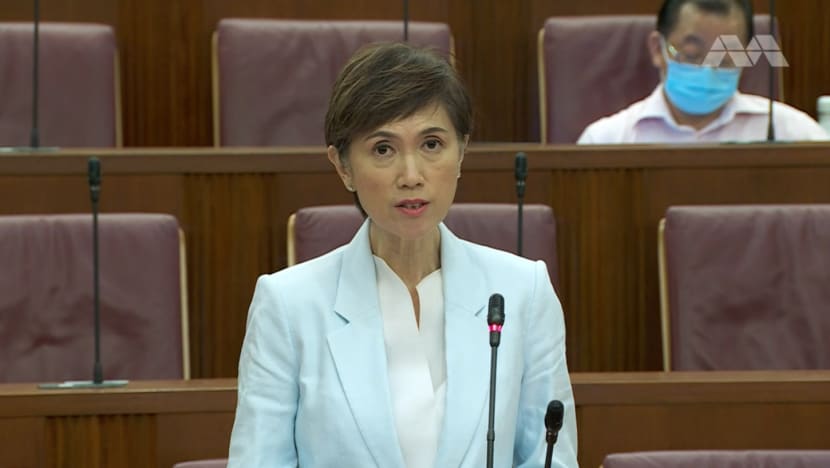Local media companies serve 'broader mission' beyond commercial success: Josephine Teo

Communications and Information Minister Josephine Teo speaking in Parliament during her ministry's Committee of Supply debate on Mar 4, 2022.
SINGAPORE: Local media companies serve a “broader mission” beyond commercial success, playing an important role in informing and engaging citizens, said Communications and Information Minister Josephine Teo on Friday (Mar 4).
Speaking during her ministry’s Committee of Supply debate, Mrs Teo said this is why the Government put its support behind SPH Media Trust.
“Our local media, like media outlets across the world, have seen their advertising and subscription revenue drastically reduced, buffeted by the rise of digital content platforms and new avenues for free content,” she said.
While Singapore’s local media companies - Mediacorp and SPH Media - enjoy “good reach” of 96 per cent of Singaporeans, Mrs Teo said there were no “easy answers” on how to monetise this reach.
“We hope that they can become self-sustaining, but it remains to be seen whether or when this can happen,” she added.
Mrs Teo said that comments by Progress Singapore Party's Leong Mun Wai that SPH was “government-owned” are incorrect.
“If it was, there would be no question today of public funding,” she said.
Responding to his earlier question about whether the SPH-listed company could be made to contribute more to the new SPH Media Trust, Mrs Teo pointed out that the shareholders had voted and agreed to an initial injection of S$80 million cash and S$30 million worth of shares for SPH Media Trust.
If the restructuring proposal involved an even higher contribution, the shareholders could have walked away, she said.
“The (company limited by guarantee) might not have been formed, and the SPH media business could have remained on its trajectory of decline, with scant hope for revival. In time to come, there would be nothing worthwhile to preserve,” she added.
Mrs Teo highlighted that Parliament had been fully briefed on the need for the restructuring and accepted that Singapore’s local mainstream media is worthy of public funding.
When compared to the investments seen elsewhere in the world, she said the amount of funding to support Singapore’s local media’s transformation must be “meaningful” in order for their efforts to have a chance.
“We cannot be half-hearted about it,” she said.
Turning to how the media can better meet the needs of different demographics, Mrs Teo pointed out how Mediacorp is working with its news broadcasters, as well as clan associations, to identify new talent to sustain dialect radio news broadcasts.
She added that Mediacorp also produces an animation series on sustainability and environmental awareness, to help families understand why it is important and how they can contribute.
"Left to the free market, such programmes are unlikely to be viable. I, therefore, urge members to give our local media and journalists the fullest support because they deserve it," she said.
CHARTING THE WAY FORWARD
With the global market for content set to grow to more than S$500 billion by 2025 - out of which half is in the Asia-Pacific - Mrs Teo said Singapore is “well-positioned” to benefit due to its robust intellectual property and legal frameworks, as well as its role as a connector between markets and cultures.
She pointed out global names including Walt Disney, iQIYI, WarnerMedia and Netflix, which already have a presence in Singapore, alongside homegrown players such as Beach House Pictures.
Going forward, MCI will continue to support these companies and local talents by exploring new partnerships with creator networks and platforms, she said.
The ministry will also partner the industry to improve the quality of content and better understand viewer preferences through data, artificial intelligence and virtual production.
“These efforts will position us as a hub for content that is both 'Made in Singapore' and ‘Made with Singapore',” she said.















